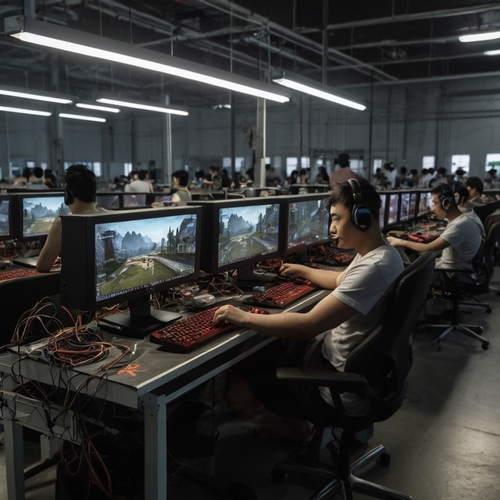The China gaming market is poised to undergo remarkable growth and transformation by 2031, driven by technological advancements, evolving consumer preferences, and regulatory shifts. As one of the largest and most dynamic gaming markets globally, China is expected to set significant trends that will shape the future of the global gaming landscape.

Growth of Cloud Gaming
One of the most impactful trends shaping the China gaming market by 2031 is the rise of cloud gaming. With advancements in 5G and improved internet infrastructure, gamers will increasingly shift to cloud-based platforms, where they can access high-quality games without requiring powerful gaming hardware. This trend will democratize gaming, making premium experiences accessible to a broader audience.
Cloud gaming services are expected to flourish, with major companies like Tencent and NetEase already investing heavily in this technology. By eliminating hardware constraints, cloud gaming will offer seamless cross-device experiences, allowing players to engage with their favorite games on mobile devices, PCs, or smart TVs.
Mobile Gaming Continues to Dominate
China’s mobile gaming market is already the largest in the world, and its dominance is expected to continue through 2031. With a growing population of smartphone users, mobile gaming will remain the most popular gaming platform in China. Advances in mobile processing power and the development of more immersive and complex mobile games will further fuel this trend.
Casual and hyper-casual games are likely to maintain a stronghold, but there will also be increased focus on mobile games that provide console-like experiences. As esports continue to gain popularity in China, mobile esports, in particular, will grow, with competitive games optimized for smartphones attracting millions of players and spectators alike.
Rise of Esports
Esports has already become a significant part of China’s gaming culture, and its growth is expected to accelerate by 2031. China is home to some of the largest esports tournaments and has a robust infrastructure supporting competitive gaming. By 2031, the industry will see further investment in esports arenas, training centers, and professional leagues.
Esports’ popularity among younger generations, along with government support for building China as an esports hub, will solidify its role as a leading entertainment sector. Professional players will continue to enjoy celebrity status, and the country will host more international events, further enhancing its position as a global leader in esports.
Virtual Reality (VR) and Augmented Reality (AR) Gaming
The integration of VR and AR technologies into gaming is another significant trend that will shape the China gaming market by 2031. While still in its early stages, VR and AR are expected to mature over the next decade, providing gamers with more immersive and interactive experiences. With the Chinese government’s focus on promoting innovation and domestic technology development, VR and AR games could become mainstream by 2031.
By offering highly immersive experiences, VR and AR gaming will allow players to engage in virtual worlds in ways previously unimaginable. From fully interactive multiplayer experiences to augmented reality games that blend the real world with the digital one, the gaming experience will expand beyond traditional screens.
Regulatory Environment
The Chinese government plays a central role in shaping the gaming industry through regulation. While there have been concerns about strict rules, such as limiting the amount of time minors can spend on games, the regulatory environment will continue to evolve. By 2031, China is expected to balance its focus on protecting younger players while encouraging the growth of its domestic gaming industry.
The government is also likely to push for more Chinese-developed games, reducing dependence on foreign gaming companies. This shift will support the growth of homegrown developers and increase the global presence of Chinese gaming content.
Social Gaming and the Metaverse
Another trend expected to gain traction in the China gaming market by 2031 is social gaming and the rise of the metaverse. The metaverse refers to interconnected virtual worlds where players can socialize, attend events, and engage in activities beyond traditional gaming. Chinese tech giants like Tencent are already exploring metaverse platforms, and this trend is set to grow in the coming years.
Social gaming, where players can interact in real time, will continue to rise in popularity. Whether it’s multiplayer online games or virtual spaces where gamers can connect, socialize, and participate in non-gaming activities, the lines between social media and gaming will blur.
Conclusion
The China gaming market in 2031 will be shaped by several key trends, including the rise of cloud gaming, mobile dominance, the esports boom, and the growing influence of VR and AR technologies. Regulatory changes will also continue to influence the industry, while social gaming and the metaverse will open up new dimensions of engagement. As one of the world’s largest gaming markets, China will continue to set the pace for innovation and growth in the global gaming landscape.
No responses yet